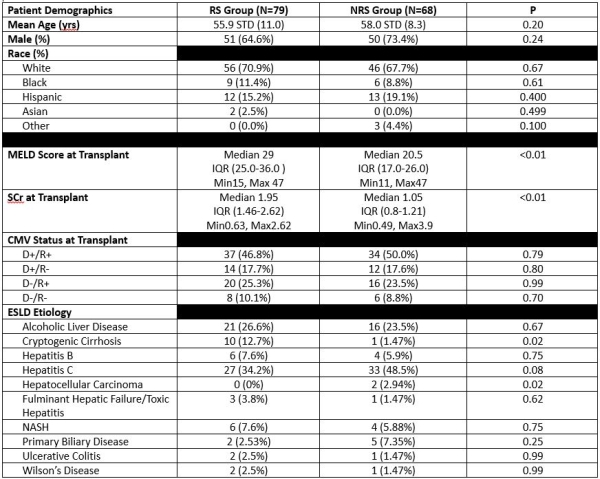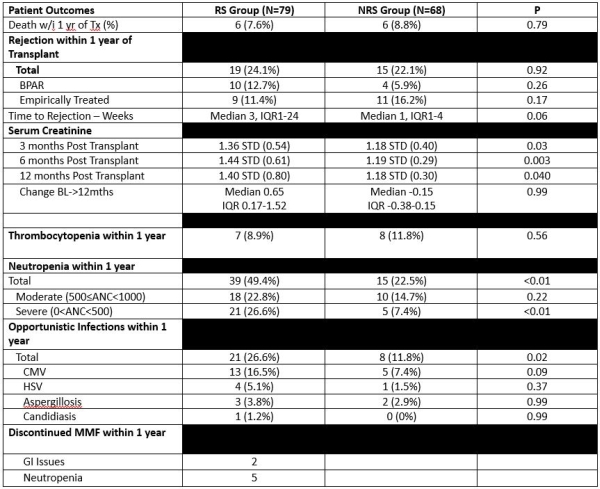A Retrospective Review of a Renal Sparing Protocol in Orthotopic Liver Transplantation
1Department of Medicine, Northwestern Medicine, Chicago, IL
2Pharmacy, Northwestern Medicine, Chicago, IL
3Hepatology, Northwestern Medicine, Chicago, IL.
Meeting: 2015 American Transplant Congress
Abstract number: B133
Keywords: Immunosuppression, Mycophenolate mofetil, Neutropenia, Renal dysfunction
Session Information
Session Name: Poster Session B: Liver - Kidney Issues in Liver Transplantation
Session Type: Poster Session
Date: Sunday, May 3, 2015
Session Time: 5:30pm-6:30pm
 Presentation Time: 5:30pm-6:30pm
Presentation Time: 5:30pm-6:30pm
Location: Exhibit Hall E
Liver transplant recipients with pre-existing renal insufficiency are placed on a renal sparing protocol (RSP) consisting of delayed initiation of low-dose tacrolimus in addition to the use of high-dose mycophenolate and corticosteroids.
Methods: This was a retrospective chart review of patients age >18 years old who received orthotopic liver transplants at NMH between 2010-2012. The primary objective of this study was to evaluate whether liver transplant recipients placed on the RSP experienced higher rates of rejection within one year of transplant than patients on the non-renal sparing (NRS) protocol. Secondary objectives assessed adverse effects associated with the use of high-dose mycophenolate including neutropenia, thrombocytopenia, and opportunistic infection (OI).
Results: 147 patients transplanted between 2010-2012 were evaluated. Total rejection was not statistically different between groups. Observed rates of OI of any type were higher in the RSP group. CMV, HSV, and aspergillosis were observed in both groups with CMV most frequently observed. Patients in the RSP group had significantly higher rates of neutropenia when compared to the NRS group. In the RSP population, 7 patients discontinued mycophenolate prior to the protocol defined 48 week point due to adverse events.
Conclusion: A renal sparing protocol utilizing high dose mycophenolate, and low dose, delayed initiation tacrolimus does not appear to put patients at a higher risk of rejection within 1 year of transplant, but does appear to cause higher rates of OI and neutropenia.


To cite this abstract in AMA style:
Pierce B, Levitsky J, McLaughlin M, Richardson C. A Retrospective Review of a Renal Sparing Protocol in Orthotopic Liver Transplantation [abstract]. Am J Transplant. 2015; 15 (suppl 3). https://atcmeetingabstracts.com/abstract/a-retrospective-review-of-a-renal-sparing-protocol-in-orthotopic-liver-transplantation/. Accessed February 21, 2026.« Back to 2015 American Transplant Congress
